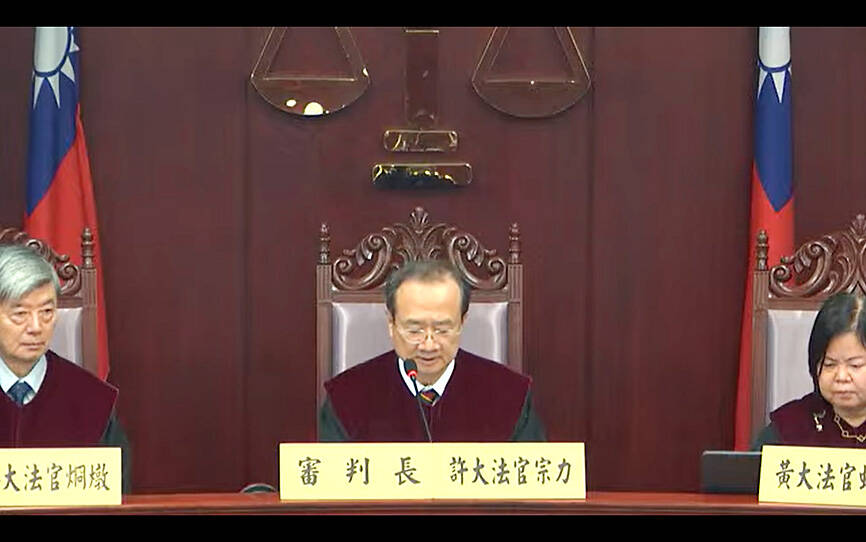The Constitutional Court on Friday upheld the constitutionality of legal provisions used to punish people who have changed their household registration to vote where they did not live, work or study.
The grand justices found the three provisions under Article 146 of the Criminal Code to be constitutional, because what constitutes illegality is clearly defined and does not infringe on people’s rights to equality, vote and move freely as enshrined in the Constitution.
The punishment is also proportional, Chief Justice Hsu Tzong-li (許宗力) said.

Photo: Wu Cheng-feng, Taipei Times
Article 146 states that a person who illegally intervenes in voting or falsifies voting results, fraudulently changes their household registration to be eligible to vote in a different constituency or attempts to commit such offenses, faces up to five years in prison.
Taiwan’s voting laws are tethered to the household registration system, whereby citizens have to register their primary abode with the government. Eligible voters then have to cast their ballot at a polling booth in an electoral district where they have been registered for a minimum of four consecutive months prior to an election.
Twenty people found guilty of offenses under the article in five elections that took place from 2006 to 2018 asked the grand justices to rule on the constitutionality of the provisions, citing the constitutional right to vote and freedom to choose a residence, among other reasons.
One of the 20, a resident of then-Taipei County (now New Taipei City), surnamed Hu (胡), registered as living in Hualien in February 2006, enabling him to cast a ballot for his uncle who was running for village warden in June that year. He moved his household registration back to Taipei County after the election, and was chargedwith voting interference.
The Hualien District Court sentenced Hu to two months in jail, which could be converted to a fine and one year of deprivation of civil rights. The ruling was later upheld by the High Court in the final verdict.
In another case, Liu Huei-tsung (劉惠宗) and the other two members of China Airlines’ labor union were found guilty of moving their household registrations in Taipei to Taoyuan in July 2018, so that they could vote for their colleague in the Taoyuan mayoral election in November that year.
They each received a three-month sentence, which could be converted to a fine, two-years probation and deprivation of civil rights for one year. The Supreme Court upheld that ruling.
Despite ruling in favor of the constitutionality of Article 146, which the trio were found to have breached, the Constitutional Court ordered a retrial at the Supreme Court, saying that it failed to take into account that the union members had commuted to work in Taoyuan for 20 to 30 years, despite all living in Taipei.
Taiwanese can choose their place of residence or work for household registration, and given that the three union members met the four-month threshold to vote in the Taoyuan mayoral election after they registered households in the city, the Supreme Court’s ruling was tantamount to an infringement of their right to vote, the Constitutional Court said.

Taiwan is stepping up plans to create self-sufficient supply chains for combat drones and increase foreign orders from the US to counter China’s numerical superiority, a defense official said on Saturday. Commenting on condition of anonymity, the official said the nation’s armed forces are in agreement with US Admiral Samuel Paparo’s assessment that Taiwan’s military must be prepared to turn the nation’s waters into a “hellscape” for the Chinese People’s Liberation Army (PLA). Paparo, the commander of the US Indo-Pacific Command, reiterated the concept during a Congressional hearing in Washington on Wednesday. He first coined the term in a security conference last

Prosecutors today declined to say who was questioned regarding alleged forgery on petitions to recall Democratic Progressive Party (DPP) legislators, after Chinese-language media earlier reported that members of the Chinese Nationalist Party (KMT) Youth League were brought in for questioning. The Ministry of Justice Investigation Bureau confirmed that two people had been questioned, but did not disclose any further information about the ongoing investigation. KMT Youth League members Lee Hsiao-liang (李孝亮) and Liu Szu-yin (劉思吟) — who are leading the effort to recall DPP caucus chief executive Rosalia Wu (吳思瑤) and Legislator Wu Pei-yi (吳沛憶) — both posted on Facebook saying: “I

The Ministry of Economic Affairs has fined Taobao NT$1.2 million (US$36,912) for advertisements that exceed its approved business scope, requiring the Chinese e-commerce platform to make corrections in the first half of this year or its license may be revoked. Lawmakers have called for stricter enforcement of Chinese e-commerce platforms and measures to prevent China from laundering its goods through Taiwan in response to US President Donald Trump’s heavy tariffs on China. The Legislative Yuan’s Finance Committee met today to discuss policies to prevent China from dumping goods in Taiwan, inviting government agencies to report. Democratic Progressive Party Legislator Kuo Kuo-wen (郭國文) said

The Ministry of Economic Affairs has fined Taobao NT$1.2 million (US$36,900) for advertisements that exceeded its approved business scope and ordered the Chinese e-commerce platform to make corrections in the first half of this year or its license would be revoked. Lawmakers have called for stricter supervision of Chinese e-commerce platforms and more stringent measures to prevent China from laundering its goods through Taiwan as US President Donald Trump’s administration cracks down on origin laundering. The legislature’s Finance Committee yesterday met to discuss policies to prevent China from dumping goods in Taiwan, inviting government agencies to report on the matter. Democratic Progressive Party